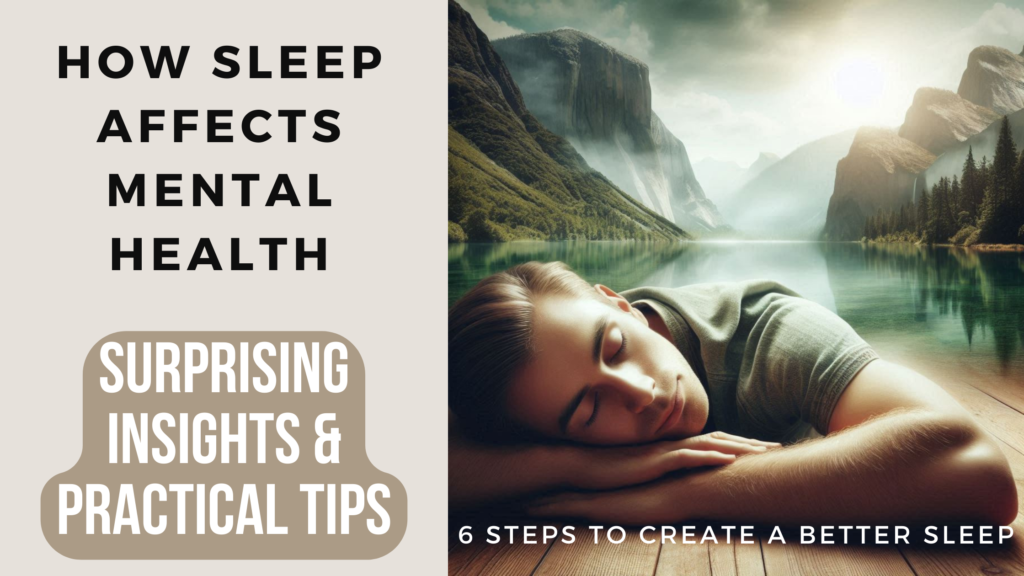Introduction
Have you ever puzzled why a harassed night leaves you feeling mentally off-balance the next day? Sleep and mental fitness are more interconnected than many apprehend. Understanding this courting may be a critical aspect in unlocking better cognitive fitness. Let’s dive into the surprising impact of sleep on human psychology and discover actionable suggestions to decorate your well-being.
“The satisfactory bridge between depression and hope is a good night time’s sleep.”
E. Joseph Cossman

First, we can investigate the exclusive mechanisms by which sleep and mental health are associated. Then, we can discuss our professional, realistic recommendations for improving sleep quality.
Sleep and Mental Health
Understanding the Crucial Link Between Sleep and Mental Health
Sleep is a fundamental human body need that affects every issue in our lives. It is critical for cognitive functions, emotional law, and ordinary well-being. According to the Healthy Eating, Physical Activity, and Sleep Hygiene (HEPAS) research studies, adopting healthful lifestyles, together with proper sleep hygiene, can notably reduce the risk of developing neuropsychiatric problems. According to this study, these disorders, which encompass generalized tension sickness (GAD), pressure, and schizophrenia, are widely regularly occurring and frequently debilitating, underscoring the significance of preventive measures.
How Sleep Affects Emotional Regulation
Adequate sleep is essential for mood law. Without enough sleep, the thoughts’ potential to manage pressure, anxiety, and melancholy becomes compromised. Studies show that sleep loss can extend emotional responses and decrease the capability to deal with strain.
The Cycle of Poor Sleep and Mental Health
Bad sleep can cause psychiatric problems, which in turn can bring about worse sleep, creating a vicious cycle. Therefore, it’s essential to break this cycle to attain intellectual well-being, and this may best be carried out by getting adequate sleep.
Sleep and Mental Health Disorders
Chronic sleep issues can cause or exacerbate high-brow disabilities. Conditions like insomnia (unable to get sleep), sleep apnea, and stressed leg syndrome are frequently related to despair, anxiety, and bipolar sickness. Addressing sleep issues can be a vital step in handling intellectual fitness.
Correlation Between Sleep and Mental Health
The relation of sleep with intellectual health is profound and bidirectional. Poor sleep can lead to high-brow fitness problems, and terrible mental conditions will have a harmful effect on sleep. With statistics about this connection, you could take steps to enhance both your sleep and intellectual health.
Good Sleep and Mental Health
Good sleep hygiene and healthy sleep conduct are critical for retaining intellectual well-being. Establishing a constant sleep schedule, creating a chilled bedtime habit, and optimizing your sleep environment can all contribute to progressed mental and behavioral fitness.
Irregular Sleep Patterns and Mental Health
Irregular sleep styles can disrupt the frame’s inner clock and negatively impact intellectual fitness. Maintaining a regular sleep timetable permits you to regulate your mood and decreases the hazard of developing psychiatric disease.
Facts About Sleep and Mental Health
Understanding the facts about sleep and intellectual health can assist in highlighting the importance of proper sleep behavior. For instance, persistent sleep deprivation has an instantaneous strong relation to developing depression, tension, and even suicidal thoughts. Factors Affecting Sleep and Mental Health What Mental Factors Affect Sleep? Mental health situations like generalized tension sickness (GAD), melancholy, and strain can notably have an effect on sleep patterns. These conditions can cause either insomnia or hypersomnia, disrupting the natural sleep cycle and impacting both physical and intellectual health.
Impact of Working Hours on Sleep and Mental Health
Working in shifts and irregular hours can disrupt sleep patterns badly, leading to sleep deprivation and mental problems. Establishing a regular, recurring, and nap-conducive environment can help alleviate those consequences.
How Does Social Media Affect Sleep and Mental Health?
Excessive use of social media these days, especially before bed, can negatively affect sleep and human psychology. The blue mild emitted through cellular display presentations can suppress melatonin production from pineal glands inside the brain of our body, making it hard for us to sleep and stay asleep.
Sleeping Position and Mental Health
Sleeping position can affect sleep and intellectual fitness. Certain positions also contribute to sleep troubles, which in turn can affect high-brow talents and cause cognitive impairment. In addition to mental health, bad sleeping posture can cause various physical problems like muscular spasms, returned pain and heartburn, or gastroesophageal reflux disease (GERD). Therefore, finding a cushy sleeping position that promotes proper sleep is equally critical for bodily and intellectual health.
Sleep in Adolescence: Physiology, Cognition, and Mental Health
Adolescence is an important period of life that requires proper sleep, cognition, and well-being. The brain undergoes significant developmental changes during this time, and good sleep is essential for wholesome development. Inadequate sleep during childhood can result in cognitive and psychiatric troubles in later life.

Benefits of High-Quality Sleep for Mental Health
Healthy sleep patterns can:
- Boost Mood: Adequate sleep complements mood balance and reduces irritability, leading to a stronger and extra excellent temper.
- Enhance Cognitive Function: Sleep is vital for memory consolidation, problem-solving, and robust decision-making.
- Reduce Stress: High-quality sleep reduces cortisol levels, the stress hormone, leading to more serene and peaceful sleep.
- Improve Resilience: Well-rested human beings are better prepared to cope with disturbing conditions and stressors in day-to-day routines.
“Sleep is the golden chain that ties health and our bodies together.”
Thomas Dekker
Six Steps to Create a Better Sleep Environment
1. Establish a Consistent Sleep Schedule: Going to a mattress and waking up at the same time each day, even on weekends, allows you to regulate your frame’s internal clock and maintain a circadian rhythm. This consistency can decorate the pleasantness of your sleep.
2. Create a Relaxing Bedtime Routine: Adopting calming activities earlier than the bed, such as reading, meditating, or taking a warm tub, can beautify sleep latency and excellence. Meanwhile, stimulating sports like watching TV or using digital gadgets can interfere with sleep because the blue light emitted can interfere with melatonin manufacturing within the mind.
3. Optimize Your Sleep Environment: Keep your bedroom cool, dark, and quiet to ensure a restful sleep. Invest in a cozy bed and pillows.
4. Be Mindful of Your Diet: Avoid heavy meals, caffeine, and alcohol near bedtime. These can disrupt your sleep patterns and make it extra hard to fall and stay asleep. Moreover, these elements can also impact your physical health by causing heartburn, GERD, and early morning headaches.
5. Stay Physically Active: Regular bodily activity allows you to doze off faster and revel in deeper sleep. However, try to avoid full-of-life exercise near bedtime, as this can pump cortisol into your blood, so you can keep your mind alert and lively the whole night.
6. Manage Stress and Anxiety: Practice stress-management strategies, including mindfulness, deep respiratory, or journaling. Reducing stress lets you loosen up and prepare for a restful night’s sleep.
Conclusion
Prioritizing sleep isn’t pretty much feeling rested; it’s about safeguarding your mental and physical health. Adopting healthful sleep conduct can cause tremendous upgradation to your emotional well-being, cognitive capabilities, and universal satisfaction with life. The relationship between sleep and mental fitness is profound and bidirectional. Poor sleep can lead to mental health troubles, and intellectual health issues can affect sleep negatively.
By integrating healthy eating, physical interest, and precise sleep hygiene practices, you can substantially reduce the danger of developing neuropsychiatric problems and improve your widespread well-being. Remember, a great night time’s sleep is the foundation of a healthier, happier lifestyle. If you’re suffering from containing the hints in your daily habits, do not forget to reserve a call with one of our specialists. Did you locate those points beneficial? Please proportion your thoughts with the remarks below and test out our other articles on health and well-being!
Frequently Asked Questions (FAQs)
1. How does sleep affect intellectual health?
Sleep is essential in regulating temper, cognitive features, and intellectual well-being. Lack of sleep can exacerbate stress, tension, and melancholy; therefore good quality sleep is essential for emotional balance and resilience.
2. What are a few common mental health problems associated with sleep issues?
Conditions including generalized anxiety disorder (GAD), melancholy, bipolar disease, and schizophrenia are often linked to chronic sleep troubles like insomnia, sleep apnoea, and stressed leg syndrome.
3. How can harmful sleep cause a decline in mental fitness?
Poor sleep can disrupt emotional regulation, leading to increased pressure and anxiety. This creates a vicious cycle in which sleep problems and intellectual health issues exacerbate every other, similarly impacting average well-being.
4. What are some sensible pointers for improving sleep fine?
Establish a consistent sleep schedule, create a chilled bedtime routine, optimize your sleep surroundings, mind your diet, stay physically active, and control strain and anxiety.
5. How does social media usage affect sleep and intellectual health before bedtime?
Excessive use of social media, mainly before the mattress, can disrupt sleep by suppressing melatonin production due to the blue light emitted from monitors or mobile display screens. This can make it challenging to nod off and negatively impact intellectual fitness.
6. Can improving sleep conduct certainly make a sizable distinction in intellectual health?
Yes, adopting healthful sleep behavior can cause huge improvements in emotional well-being, cognitive capabilities, and standard best of lifestyles. Proper sleep hygiene can help reduce the danger of growing neuropsychiatric problems and beautify intellectual health
